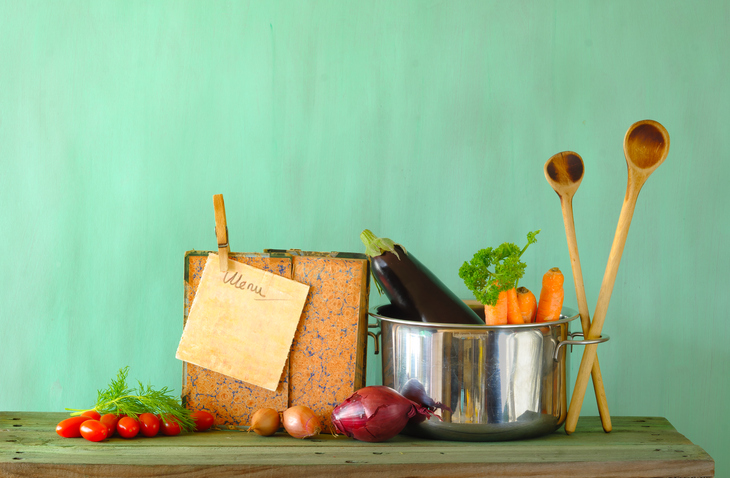New Year’s resolutions are famously frail, so pick one that’s achievable. Half of the year’s cookbooks are sold in December: this January, let one shine in use, not simply rust unburnished. As an inveterate buyer of well-chosen recipe books, and a victim of gifting that I’m ungrateful enough to call less discriminate, I have never lost my faith. Each cookbook, I believe, is the one that will change my life – despite being at the stage when I need to smuggle them in so as not to dampen my wife’s belief in the existence of our ‘one in, one out’ rule.
Cookery books have the allure of opening up an avenue to a better life
The passing years offer their own excuses for buying more. A man loves the meat in his youth that he cannot endure in his age. The fashionable joy of eating seasonally is a modern cliche, but not enough attention is paid to the seasons of our lives. These days I seem so fond of vegetables that I make them the main feature of meals, a practice which even a decade ago would have chilled my blood. I am not the only one filling their home with these books, and I send greetings to my fellow addicts. Few pages, perhaps, are spattered with the marks of use, but many leave shining furrows in our minds. We buy, we dream, we age – sometimes we even cook.
Awareness of this other form of seasonality dawned on me as I watched my son fling wide the doors of the fridge and stand, patient and unmoving as a heron. An essential stage in life, fridge-staring, and a step on the royal road to cookbook-buying. In a few years I will miss his infuriating habits, and stock that same fridge with his favourites, in fond anticipation of his return.
By then – unless I throttle him first – he will have graduated to the next essential season in culinary life, one whose pleasures never quite depart. Youths today know little of stalking the wild asparagus or picking hawthorn leaves (they were called ‘bread-and-cheese’ by hungry children of the past), but as they taste independence they begin learning to hunt yellow stickers.
In the savannah of modern life, supermarkets before closing time are oases. Reduced goods mean money saved but also opportunities unlocked. How many of us widened our culinary knowledge by returning home with bargains we would never otherwise have chosen? Thus do men master more than new ingredients or novel recipes. The book of life helps us acquire that delight in innovation so fundamental to happiness.
From small beginnings, we progress. ‘Though the love of a hyacinth may be rather domestic,’ teases Austen’s hero in Northanger Abbey, ‘who can tell, the sentiment once raised, but you may in time come to love a rose?’ In learning to cook for oneself, one starts with the parental bounty of one’s childhood fridge. The years pass. Through the foothills of yellow stickers one ascends, guided by the instructive obstacles of penury and want, and arrives at last in the sunlit uplands of cookbooks.
Some men, in middle age, turn to cycling. Far more turn to these bibles of domestic contentment. Running my fingers along their spines, I think less of their cost than their promise; their pages add value to my life, not my library. I have read Hemingway and Mailer, but I also grew up admiring Tom and Barbara in The Good Life. That gentler notion of adulthood is more to my liking. Easier to manage, too, with an arthritic knee, and less embarrassing than cycling with a lycra-covered paunch.
Cookery books have the allure of opening up an avenue to a better life: one where a man glazes his hams with his own preserves, stores up jars of sauce made from his summer tomatoes, makes dirty martinis with his own special recipe pickle brine, cures his own meat, fish, and vegetables, nonchalantly offers guests a warming glass of his beech leaf liqueur. For recipes, there’s Google; for fantasies, there are books. What we hope for is not a list of ingredients but a path to self-improvement, the recipe to growing rich in accomplishment, improved in character.
All of us dream of being better versions of ourselves, and perhaps we’d be worse versions of ourselves if we didn’t. Maybe our kitchens dream of being packed with home-made pickles. No matter that so much is imaginary; life needs to be sown with dreams, larded with fantasy. Reading my latest acquisition, glancing through its recipes, I feel for a moment that I have become not only a better cook, but a better man. In the spring of our lives we stare into refrigerators; by late summer, we pore over books, and somewhere along the way we learn to cook a little, and make our days richer with small joys. A pleasant life, I remind myself, as I look up from my book to see the fridge door standing open, and hear myself shouting at my son.







Comments